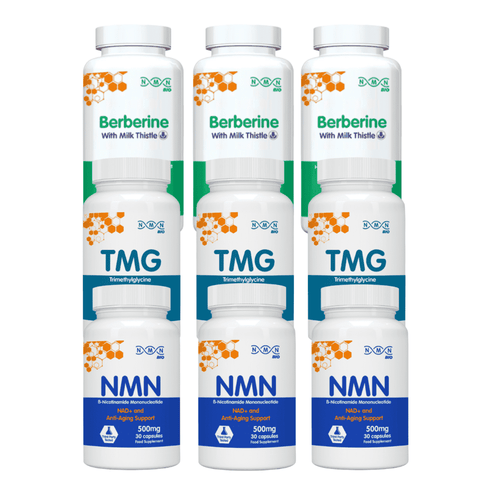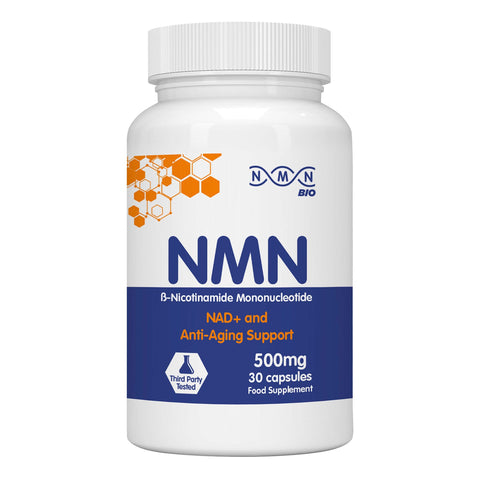Berberine and Blood Pressure: Benefits, Precautions, and Effective Usage

Are you wondering if berberine and blood pressure are connected? This article explores the effects of berberine on blood pressure, backed by clinical evidence and scientific mechanisms. We’ll also discuss dosages, side effects, and safety considerations to help you decide if it’s right for you.
Key Takeaways
-
Berberine may effectively lower both systolic and diastolic blood pressure, improving cardiovascular health.
-
Consultation with healthcare providers is essential before starting berberine to ensure safety and monitor potential drug interactions.
-
While promising, the effectiveness of berberine varies, and more rigorous studies are needed to confirm its role in hypertension management.
How Berberine Affects Blood Pressure
Berberine may assist in lowering both systolic and diastolic blood pressure by positively influencing cardiovascular function. This dual action is particularly significant because it addresses the two key components of blood pressure readings and blood pressure numbers, thus offering comprehensive blood pressure control.
Berberine reduces blood pressure levels by promoting better blood flow and reducing vascular resistance, making it a viable supplement for managing high blood pressure.
Additionally, berberine stimulated glucose uptake, indirectly supporting cardiovascular health. Its ability to improve lipid dysregulation and suppress proinflammatory responses highlights its multifaceted benefits.
Mechanisms of Action
Berberine exerts its effects on blood pressure through several intricate mechanisms:
-
Activation of AMP-activated protein kinase (AMPK).
-
Facilitation of the release of nitric oxide, a crucial molecule that promotes endothelium-dependent relaxation.
-
Enhancement of endothelial function, which helps combat vascular stiffness, a common issue in individuals with high blood pressure.
Another significant mechanism is the vasodilatory effect of berberine, which is akin to the action of calcium channel blockers. Blocking α1 receptors in vascular smooth muscle cells, berberine induces vasodilation, which reduces blood pressure and offers a natural alternative to traditional medications.
Additionally, berberine’s influence on nitric oxide release not only improves endothelial function but also helps in managing blood clotting, a crucial aspect of cardiovascular health. Reducing the risk of blood clots, berberine provides additional protection against heart disease and stroke.
Furthermore, berberine’s interaction with human intestinal bacteria and its ability to modulate inflammatory cytokines contribute to its overall cardiovascular benefits. These interactions emphasize berberine’s role in maintaining beneficial bacteria balance, essential for gut health and overall well-being.
Clinical Evidence on Berberine for Hypertension
Clinical studies on berberine’s efficacy in treating hypertension present a mixed but promising picture. A systematic review included five randomised controlled trials and two non-randomised trials with a total of 614 participants. The findings suggested that berberine showed some effectiveness in lowering systolic blood pressure, although the overall quality of the evidence was deemed low and inconclusive.
Comparative studies have indicated that berberine did not demonstrate significantly better results than amlodipine alone for blood pressure reduction. However, one study noted that a nutraceutical containing berberine significantly reduced systolic blood pressure compared to a placebo. This suggests that while berberine has potential, its effectiveness may vary depending on the formulation and combination with other substances.
Clinicians should exercise caution in recommending berberine for hypertension due to insufficient data regarding its effectiveness and safety. However, daily intake of berberine may effectively reduce blood pressure when used alongside antihypertensive medications.
The evidence underscores the need for more rigorous studies to establish berberine’s role in blood pressure management conclusively. Until then, it remains a promising but supplementary option for those seeking to lower their blood pressure naturally.
Recommended Dosages for Blood Pressure Management
Determining the appropriate dosage of berberine for blood pressure management is crucial for both efficacy and safety. It is essential to consult healthcare providers before starting berberine supplements, particularly due to individual health conditions and potential interactions with other medications.
The recommended dosage range for berberine in managing blood pressure typically falls between 500 to 1,500 mg per day. This range allows for flexibility based on individual needs and responses. Berberine is considered safe for adult use at doses up to 1.5 grams daily, and it can be taken for extended periods, up to two years.
When combined with blood pressure medications like losartan, monitor:
-
blood pressure
-
blood sugar
-
potassium levels
-
kidney disease
-
liver function
Regular monitoring ensures necessary dosage adjustments can be made to optimize effectiveness and safety.
The goal is to achieve a balance where berberine contributes to lower blood pressure without causing adverse effects or interactions. Following recommended dosages and consulting healthcare providers helps individuals safely incorporate berberine into their regimen.
Potential Side Effects and Safety Concerns
While berberine is generally considered safe, it is not without potential side effects and safety concerns. Common side effects may involve gastrointestinal issues, including:
-
Diarrhea
-
Constipation
-
Gas
-
Upset stomach These issues are often mild but can be problematic for some individuals.
One of the more concerning potential side effects is low blood pressure, especially for individuals who already have low blood pressure or are on multiple blood pressure medications. Monitoring blood pressure levels regularly can help mitigate this risk factors.
Berberine has been shown to be safe at higher doses, with studies indicating it can be used safely at doses up to 1.5 grams daily for up to six months. However, people with high bilirubin levels, particularly infants, should avoid berberine due to the risk of serious health issues. This is crucial for preventing conditions like kernicterus, a severe form of brain damage linked to high bilirubin levels.
Weigh the benefits against potential risks and side effects when considering berberine for blood pressure management. Consult healthcare providers for personalised advice and monitoring to ensure safe and effective use.
Drug Interactions with Blood Pressure Medications
Berberine’s interactions with blood pressure medications are a critical consideration for those using it as a supplement. Studies suggest that taking 0.9 grams of berberine daily alongside amlodipine enhances blood pressure reduction compared to amlodipine alone. This synergistic effect can be beneficial but requires careful monitoring.
However, berberine can affect the activation process of certain medications like losartan, potentially diminishing their therapeutic effects. This interaction underscores the importance of monitoring blood pressure and making necessary dosage adjustments to avoid excessively low levels.
Moreover, berberine may alter the metabolism of various drugs processed by the liver, leading to unexpected side effects, including the effects of berberine. This includes interactions with sedative medications, diabetes medications, and others that rely on liver metabolism, such as berberine inhibition. These interactions necessitate close monitoring and consultation with healthcare providers to ensure safe and effective use.
Individuals using berberine should closely monitor their blood pressure if taking antihypertensive medications. This proactive approach helps prevent adverse interactions and ensures both berberine and conventional medications work harmoniously for optimal control.
Benefits Beyond Blood Pressure Control
Berberine’s benefits extend well beyond blood pressure control, making it a valuable supplement for overall health. It has been shown to improve heart health, which is particularly beneficial for individuals with high blood pressure. Berberine supports long-term heart health by enhancing cardiovascular function.
Another significant benefit of berberine is its ability to enhance insulin sensitivity, aiding in better glucose metabolism. This improvement in insulin sensitivity can help manage healthy blood sugar levels, reducing the risk of diabetes and its associated complications.
Moreover, berberine is noted for its potential to manage lipid levels, particularly by reducing triglycerides and high cholesterol. This stable cholesterol lowering treatment contributes to overall cardiovascular health and can help mitigate the risk of heart disease.
Finally, take berberine hydrochloride exhibits anti-inflammatory properties by lowering levels of cytokines like IL-6 and tumor necrosis factor (TNF-α). This anti-inflammatory action helps reduce chronic inflammation, which is a risk factor for various chronic diseases, including heart disease and metabolic syndrome. Additionally, berberine suppresses proinflammatory responses, as it is a notable plant alkaloid.
Precautions and Considerations
Before taking berberine, it is essential to consult a healthcare provider, especially for those on other medications. This consultation helps identify any potential interactions and ensures that berberine is a safe addition to one’s health regimen.
Pregnant and breastfeeding women are advised to avoid berberine due to potential risks to the fetus and nursing infant. The safety of berberine during pregnancy and breast milk has not been well established, and its use could pose unnecessary risks.
Newborns exposed to berberine may develop kernicterus, a serious form of brain damage linked to high bilirubin levels. This risk underscores the importance of avoiding berberine in infants and being cautious with its use during the early stages of life.
Key Takeaways
Research indicates that berberine may effectively lower both systolic and diastolic blood pressure. This potential makes it a promising supplement for individuals seeking natural ways to manage their blood pressure.
However, it is crucial to consult healthcare providers before starting berberine, monitor its effects closely, and consider possible interactions with other medications. This ensures individuals can safely incorporate berberine into their health routines and enjoy its comprehensive benefits.
Summary
In summary, berberine offers a promising natural option for managing blood pressure and improving overall cardiovascular health. Its mechanisms of action, clinical evidence, and additional health benefits make it a multifaceted supplement worth considering.
However, as with any supplement, it is essential to approach berberine with caution, consult healthcare providers, and monitor its effects. By doing so, individuals can harness the full potential of berberine while ensuring their safety and well-being.
Frequently Asked Questions
Does berberine affect your blood pressure?
Yes, berberine can help lower blood pressure by dilating blood vessels and promoting relaxation in the vascular system. This effect can be beneficial for individuals looking to manage their blood pressure effectively.
What is berberine, and how does it affect blood pressure?
Berberine is a plant alkaloid known for its potential to lower blood pressure by enhancing cardiovascular function and endothelial health. This makes it a promising option for managing hypertension.
What is the recommended dosage of berberine for managing blood pressure?
The recommended dosage of berberine for managing blood pressure is typically between 500 to 1,500 mg per day. Always consult with a healthcare provider to determine the right dosage for your specific needs.
Are there any side effects associated with taking berberine?
Berberine can cause gastrointestinal discomfort, including diarrhea, constipation, gas, and upset stomach, as well as potentially lowering blood pressure in some individuals. It's advisable to consult a healthcare provider to address these risks effectively.
Can berberine interact with blood pressure medications?
Yes, berberine can interact with blood pressure medications, potentially enhancing or diminishing their effects. It's essential to closely monitor your blood pressure and consult with your healthcare provider to prevent any adverse interactions.
Researched and reviewed by Dr Elena Seranova, Ph.D.
Dr Seranova holds a master's degree in Translational Neuroscience from the University of Sheffield, UK, and a Ph.D in Stem Cell Biology and Autophagy from the University of Birmingham, UK. She is a published author in multiple peer-reviewed journals, including Cell Reports and Developmental Cell.
LEARN MORE!
- When to take Quercetin, Berberine and TMG
- What is TMG: Understanding Its Health Benefits and Uses
- The Potential Health Benefits of Betaine: A Comprehensive Review
Confused about supplement dosing?
Get a personalised recommendation in under a minute.
For more information or inquiries, feel free to contact us.





Leave a comment